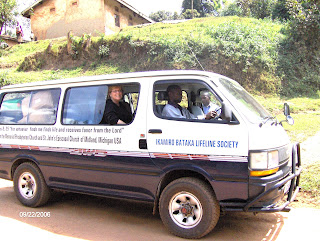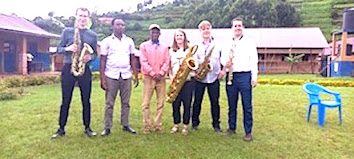The Beautiful Bakiga People
In gratitude to the wonderful friendships we have between the US and Uganda, we want to share with you more about the people themselves who live in SW Uganda.
The Bakiga tribe (pronounced bah chee ga), also know as "people of the mountains," inhabit Kabale and part of Rukungiri Districts. Traditionally, they are a physically strong people. They speak Rukiga (pronounced roo chee ga), a Bantu language.
They are very friendly, always willing and ready to lend a helping hand. And, when they love and care, they do it immensely! Hard work and strength is one of the traits that the Bakiga people are known for. In the past, the male children would divide their father's estate amongst themselves. It was normal for fathers to give some land to their daughters upon marriage as part of the assets to accompany the daughter to her new married life. This used to act as an asset start up for the new family particularly when the boy's parents asset base was lacking. At other times when the girl's father either had fewer boys or had land in abundance.
Marriage is a very important cultural institution among the Bakiga. There is the traditional marriage ceremonies and more recently, religious church ceremonies. Traditionally, no marriage could be honored without the payment of the bride wealth. In the past, a marriage could be arranged by the boy's father or uncle on the boy's behalf. The final arrangements could only be made after the payment of bride wealth. The bride was normally paid by the boy's father. It involved cows, goats and garden hoes. The amount paid differed from family to family. Bakiga were traditionally a polygamous culture but that is now discouraged.
Boys tended to marry at a slightly later age, between eighteen and twenty years, while girls could be married off between fourteen and sixteen years of age. Today, earlier marriage for girls is discouraged but not completely gone. The normal trend was for girls from families with more resources to get married later than girls from poorer families. Before marriage, a girl would spend a month or so in seclusion. During this period, she would be well-fed and instructed in the art of home management.
The Bakiga believed in a supreme being, Ruhange or Kazooba Nyamuhanga, the Creator of all things earthly and heavenly. Today, most Bakiga are Christians and Islam is growing in Uganda. The Christians are divided into primarily Anglican, Catholic and Evangelical traditions.
The Bakiga are a celebratory people. The form of dance for the Bakiga is called the Ekizino and it is a royal dance for the Bakiga. Kigezi which is known as "Switzerland of Africa" because of its weather and landscape. Temperatures at night readily drop to 40-50 Fahrenheit, is where we take the ACT Teams when we travel there. It is between 6,000 and 7,000 ft elevation (think Aspen, CO) but just south of the equator. Livestock are sometimes kept indoors, often under a raised wooden pole bed, to generate heat to keep the family warm. During colder months, Ekizino is the warm up dance. Since Kigezi is a hilly region, the people who go out farming early in the morning cold must jump around for a while to get warm. Traditionally, the people also used to stamp the ground until they found signs of water. This is a very vigorous dance that represents their jumping and stamping and is meant to demonstrate stamina and strength. Women participate as well with a more elegant display of their arms. Enjoy a short video of one of the church choirs we attend locally:
A week spent in the company of the Bakiga people is a week full of joy, celebration and gratitude. They talk about and share their trust in God (Ruhanga). It is a witness to us in the US, to experience their reliance on God.






I watched the few minutes of their traditional dancing. Very joyful and very tiring!! Thanks for sharing the entire article
ReplyDeleteVery joyful! And the red choir robes and happiness. Check out those smiles in the crowd!
ReplyDelete